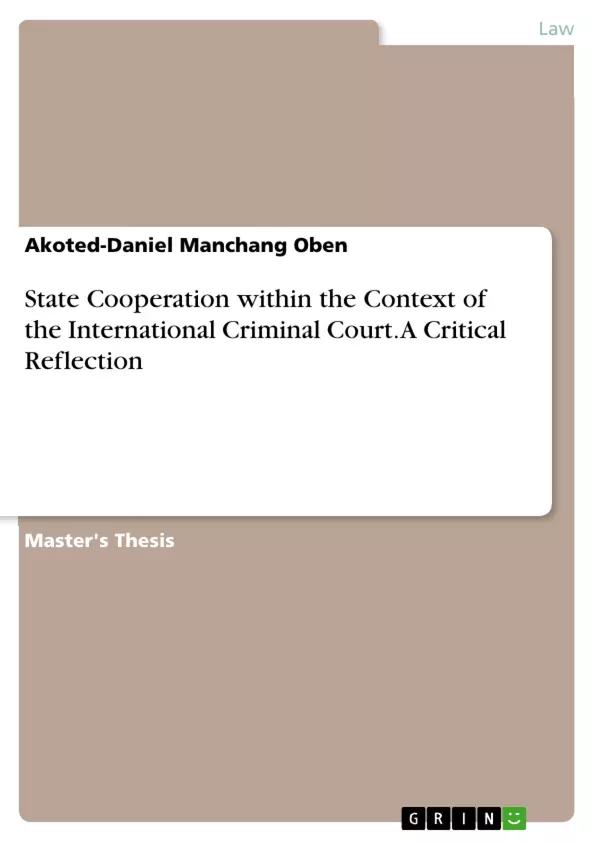This dissertation focuses on the concept of state cooperation as it applies within the context of the International Criminal Court (ICC). The study examines the extent to which the cooperation of states facilitates the role of the ICC in fulfilling its objective of arresting impunity on the international stage. Despite the fact that the Rome Statute bestows upon states an obligation to cooperate with the ICC, the court has over the years continued to face significant instances of non-cooperation which has been identified as one of the major challenges facing the court in the achievement of its mission of combating international crimes and ending impunity for such crimes.
The study adopts qualitative research based on doctrinal method of legal research, making use of a content analysis of primary and secondary sources of data. Findings of this study reveal that indeed, the concept of state cooperation is a fundamental requirement for the effective functioning of the ICC. This study also reveals that the ICC continues to experience significant instances of non-cooperation from states for several reasons including: the lack of enforcement powers, conflicting obligations, interests and immunities, domestic and international politics, and a perception of bias by African states. To address the problem of non-cooperation, this study recommends the restriction of the application of the doctrine of immunity as it applies to the ICC, amongst others. The study further recommends for an improvement in the ICC's collaboration with regional/continental organizations so as to facilitate and improve on the level of states cooperation with the International Criminal Court.
Inhaltsverzeichnis (Table of Contents)
- CHAPTER ONE
- GENERAL INTRODUCTION
- 1.1 BACKGROUND TO THE STUDY
- 1.2 STATEMENT OF THE PROBLEM
- 1.3 RESEARCH QUESTIONS
- 1.3.1 Main Research Question
- 1.3.2 Specific Research Questions
- 1.4 RESEARCH OBJECTIVES
- 1.4.1 Main Objective
- 1.4.2 Specific Objectives
- 1.5 RESEARCH METHODOLOGY
- 1.6 LITERATURE REVIEW
- Gaps in Literature
- 1.7 THEORETICAL FRAMEWORK
- 1.7.1 The Triple Pronged Theory
- 1.7.2 The Distributive Theory of Criminal Law
- 1.7.3 The Retributive/Denunciatory Theory of Punishment
- 1.8 JUSTIFICATION FOR THE RESEARCH
- 1.9 SIGNIFICANCE OF THE STUDY
- 1.10 SCOPE OF THE STUDY
- 1.11 LIMITATIONS OF THE STUDY
- 1.12 DEFINITION OF KEY TERMS
- 1.13 SYNOPSIS OF THE CHAPTERS
Zielsetzung und Themenschwerpunkte (Objectives and Key Themes)
This dissertation examines the role of state cooperation in the functioning of the International Criminal Court (ICC). It explores the extent to which state cooperation facilitates the ICC's objective of ending impunity for international crimes. The research investigates the challenges posed by non-cooperation and analyzes the reasons behind it.
- State Cooperation and the ICC
- Challenges to State Cooperation with the ICC
- The Role of the Rome Statute in Encouraging Cooperation
- The Impact of Non-Cooperation on the ICC's Effectiveness
- Potential Solutions to Address Non-Cooperation
Zusammenfassung der Kapitel (Chapter Summaries)
Chapter One provides a general introduction to the study, outlining its background, research questions, objectives, methodology, theoretical framework, justification, significance, scope, limitations, and key terms. It also includes a synopsis of the chapters to follow.
Schlüsselwörter (Keywords)
The dissertation focuses on key concepts related to international criminal law, including the International Criminal Court (ICC), state cooperation, non-cooperation, impunity, international crimes, the Rome Statute, the doctrine of immunity, and the ICC's effectiveness.
- Quote paper
- Akoted-Daniel Manchang Oben (Author), 2022, State Cooperation within the Context of the International Criminal Court. A Critical Reflection, Munich, GRIN Verlag, https://www.grin.com/document/1416377



